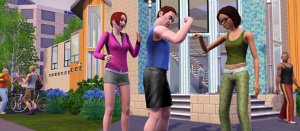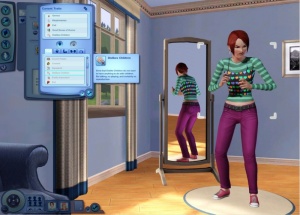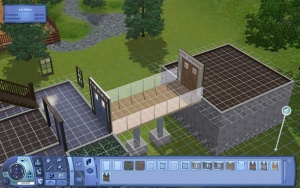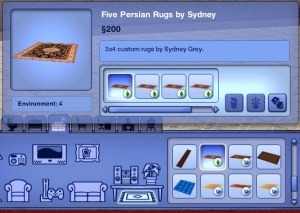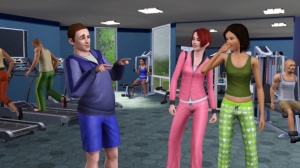The Sims 3
|
The Sims 3 is the third installment of the single-player, life simulation PC game, The Sims. The Sims Studios (developer) and EA Games (publisher) released this sequel of The Sims 2 in June of 2009. It sold over a million copies in its first week and is one of the best-selling PC video games of all time. [1]
Just as gameplay works in the Sims and Sims 2, players create characters called Sims and control various aspects of their lives without a specific game-provided goal. The overarching motto of all The Sims games has been: "Build. Buy. Live," which are also the names of the "modes" in the game. Build Mode allows players to build property in the Sims World, Buy Mode allows players to populate these properties with objects for Sims to use, and Live Mode allows players to control the actions of the Sims they create.
Ethical concerns have arisen in relation to the treatment of virtual characters, and the actions allowed to users by game developers that programmed the Sim game and characters. Additionally, there is controversy surrounding addiction to the game and concern with the age demographic that is able to access it.
Contents
Gameplay
Create-A-Sim
See also: Avatars
The Create-A-Sim tool allows the player to personalize each Sim’s clothing and physical features. The player has free range to toggle any of the available options for customization or the ability to randomize a character. Customization includes things like physical appearance, hairstyle, facial hair, clothing, and accessories.
First Tab
The first tab in the process is the Basics tab. The Basics tab allows the player to give their Sim a first and last name, choose their sex (male or female) and age (Toddler, Child, Teen, Young Adult, Adult, Elder). The Baby age option is only available in Live Mode and is accessed through two ways-- two young adult/adult Sims having a child naturally through the 'Try for Baby' interaction or by calling a social worker and adopting a baby. The skin color selector is also available on this tab. The player must pick one of six relative skin tones (white, peach, brown, pink, blue, or green), and then can use the slider to choose a more specific skin color within that particular tone. The player can also use a slider to alter weight and muscle tone, including breast size in female Sims.
Second Tab
The second tab is 'Hair'. Players can edit the hairstyle, eyebrow style, facial hair (for male Sims), and body hair (on the arms, legs, chest, back, and underarms) of their Sims character. In addition, accessories such as hats or bows can be added to their Sims and the color for all of these options is selected.
Third Tab
The third tab in the process is 'Looks'. Here, the player has seemingly unlimited control over the appearance of their Sims' facial features. Sliders and toggles similar to those seen in previous tabs are used to alter overall structure of the head, ears, eyes, nose, and lips. Players have the option to go into Advanced mode, where they have even more power over the position, spacing, and color of these body parts. Further, players can add freckles, beauty marks, age lines, and the like. Also available in this tab is the opportunity to give the Sim makeup or tattoos.
Fourth Tab
The fourth tab is for clothing. One or more different outfits for different occasions (Everyday, Formal, Sleepwear, and Swimwear) are pieced together. The game comes pre-loaded with many choices of separate clothing pieces, full outfits, shoes, jewelry, and glasses that vary depending on the gender and age of the Sim being created. With a little extra effort, the player even has the option to choose a specific hairstyle for each outfit.
Final Tab
The final tab in Create-A-Sim is the Personality tab. This allows the player to give Sims personality traits that will affect gameplay such as Slob, Evil, Charismatic, and Heavy Sleeper. Combining Sims with contrasting traits can make households complicated. For instance, a "Neat" Sim and a "Slob" Sim may encounter difficulties living together. In addition to these traits, a Lifetime Wish is chosen. This decision affects the Wants and Aspirations of the Sim during Live Mode. For example, a Sim with the Lifetime Wish of Celebrated Five Star Chef will reach their peak happiness if they reach the top of the Culinary career track. Good traits to match with this would be Natural Good or Green Thumb but some players find humor in giving Sims traits that will only sabotage these goals like Clumsy. Here they can also determine their Sim's favorite food, color, music, as well as their Astrological sign - all of which have minor effects on gameplay during Live Mode.
Play with Genetics
If two young adult/adult Sims are present in the Create-A-Sim household, the Play with Genetics option becomes available. Through this, they can combine the "genes" (all of the settings chosen in the process described above) of both Sims and the output is a child that is the mix of both. The same thing is done if they were to Try for Baby in Live Mode but this way, the player can create pre-existing children and have the ability to choose the gender and age right away rather than having to start from scratch and test their chances. Each household created in Create-A-Sim can contain eight individual Sims. Before completing creation and entering one of the main gameplay modes, the player must place their Sims accordingly on a family tree. They do not necessarily have to be related but any Sims below the Young Adult age level must live with a parent or blood relative.
Gender
The Sims has removed gender-specific character restrictions through the removal of binary options for clothing, physical characteristics, hair, etc. [2] To meet the needs of their diverse audience, Sims wanted to create a more inclusive gaming environment so users don't feel confined to gender norms that are faced in society. These new options intend to let users to identify more with characters and gives them a sense a freedom of expression. Sims has a history of supporting the LGBTQ+ community ever since they allowed for same-sex marriage in their games in The Sims 3 in 2009, six years before same-sex marriage was legalized in the United States on June 26, 2015.
Build
Although there are pre-built homes available for Sims, a player may choose to design and build their own home for their family. Build mode involves building the actual structure of the house including walls, flooring and other building elements, as well as the development of the land on the property and certain landscaping measures. This includes pools. fences, fireplaces, fountains, shrubbery, natural water like ponds, and even changing the level of the land itself. Build mode makes available numerous architectural and interior design options for the player to use, but for a price. However, cheat codes for more funds can make the more extravagant options more readily available. At the player’s prerogative, a family of Sims can live in an enormous mansion on the beach or a one-room house in a normal neighborhood.Players can also build commercial properties such as malls or parks for their Sims to visit. Commercial properties are given unlimited funds, but the quality of any venue is up to the player.
Buy
Buy mode is where players furnish the homes and lives of their Sims with The Sims' own currency Simoleon once the basic structure of their environment has been completed in Build Mode. Necessities, such as refrigerators and beds, and luxuries, such as decorations and entertainment devices, are all bought in buy mode using the Sims’ household funds. These funds can be earned through Sims’ work, cheat codes, or selling unneeded items.This mode is can organized in two different ways: By Function or By Room. In the former, categories such as Entertainment, Comfort, Party, Decor, and Miscellaneous are seen whereas in the latter, items are delineated between Bedroom, Kitchen, Bathroom, etc. The objects found in Build Mode not only furnish the lives of the Sims but often times provide special interactions or ability to gain certain skills. Since it is very crucial for young Sims to be enriched and learn a lot from Baby-Teen (their success in life and school during these times determine their future traits and Lifetime Wishes), the particular items in their home can have a large effect on their lives and relationships - for good or bad.
Live
Sims have the ability to advance to up to seven age-levels before eventually dying of old-age - that is if they do not die from unnatural causes throughout the course of game progression.
During Sims’ lives, Sims behave much like the human controlling them. Toddlers are potty-trained and taught to walk and talk by their parents. Children and Teens attend school Monday through Friday and do homework. Teens can acquire a part-time job to make some money after school and even start exploring the dating world. Young adults and adults can fall in love, marry, and have babies. Elders can retire and enjoy the spoils of their success.
Time passes at a rate of one second in real life to one minute in the game. Following from this, 60 seconds in real life is one hour in the game and so on. While time passes in this way during Live mode, time freezes in both Build and Design mode. The player has the ability to pause, play, fast forward, fast forward x2, or fast forward until the current Sim's task is completed.
Moods and Needs
While the game itself does not have a specific end purpose, there are the built-in Mood and Needs meters that imply the goal of being kept high or in the green. The Mood meter for each Sim is determined by a combination of internal and external causes that are displayed to the right and which include such things as Nicely Decorated Room, Exhausted, or Feeling Lucky. Each of these causes is given a short explanation so that they can be remedied. The Needs meters work in a similar fashion but are much broader. Just like real life humans, the basic Needs of every Sim are Hunger, Bladder, Energy, Social, Hygiene, and Fun. These bars are constantly fluctuating and keeping them in the green is directly correlated to a higher Mood. There are negative consequences for letting Needs meters enter the red zone including bathroom accidents in public, going stir crazy, and even starving to death. The implicit goal of keeping a Sim's levels high is clearly supported by certain game mechanics (unhappy Sims are not easy to control) but it is not the only way to play. Many players find great fun in creating worst-case scenarios for their Sims and doing the exact opposite of everything the Sim wishes to do.
Skills
Sims can gain skills when playing. For example, Sims can take cooking classes and read cooking books to increase their cooking skills and gain the ability to prepare fancier meals than Sims with lesser skill. The advantage of having cooking skills is that the Sims' meals will be more satisfying and help feed their needs more than normal to keep them happy. Without gaining skills, your Sim is more susceptible to accidents like starting a fire when cooking or being electrocuted while fixing the TV. Sim skills are also pivotal to careers around town. For example, Sims in the military and police careers need a large amount of athletic skill to advance. Having a higher skill level means being promoted in a career track and thus, bringing in more money. The skills available to gain include Charisma, Collecting, Cooking, Fishing, Fitness, Gardening, Guitar, Handiness, Logic, Painting, and Writing each containing 10 levels of their own.
Relationships
A Sim’s relationships with his family and neighbors are also an important part of the game. Just as there are there are friends, lovers, and enemies in real life, these relationships exist in The Sims 3 as well. Sims with jobs have bosses with whom they'd be wise to maintain a good standing. Sims are also able to form a committed romantic relationship with one Sim, such as “going steady” or marriage, and have affairs with other Sims. However, there are consequences if the victim witnesses this betrayal. Interacting with other Sims gives you actions you are able to perform. These can be both friendly and unfriendly and change with the Sim's age and the relationship status they have gained with the other Sim. Interactions with other Sims depend on previous relationships, family affiliation, mood, appearance, environment, and the traits of both individuals. Sims with similar interests and traits will be much more compatible in the long run.
Death
It is completely up to the player how they want their Sims to live out their lives. They can be family oriented with a steady job, loyal spouse, and tons of kids or they can be the town maniac running around the park screaming nonsense or they can take them from birth through multiple jobs and relationships before becoming a world-famous rock star playing stadium shows. No matter how it all plays out, all Sims eventually meet their demise. Whether it is natural causes as an elder or a freak accident as a young adult, the Grim Reaper comes for them all eventually. After seen doing a bit of paperwork, the Grim Reaper will disappear along with the Sim leaving a gravestone or urn in their place. Said Sim's friends and family will mourn for some time but soon move on with their respective lives. However, this does not always mean they will never see their loved one again as it is common for ghosts of Sims past to appear in the graveyard when the sun goes down. Living Sims are able to communicate and form relationships with ghosts - as long as they are not too afraid.
Create-A-Style
A new feature that was not seen in the previous titles of the series is introduced in The Sims 3. This is the Create-A-Style button. A paintbrush and palette icon denotes this new tool that allows the players to go much deeper into the customization of an object than ever before. While the game limits the types of objects that Sims can wear or interact with, this option gives a little more freedom in the style, color, etc. of those for more variation across the board. The button can be seen in almost every mode of gameplay from editing the precise color tone of hair to changing the wood of a dresser to match the bed frame. Create-A-Style does not alter the way the game itself is played but can make it more enjoyable for the more creative or finicky player.
Expansions
The previous Sims games (The Sims and The Sims 2) were limited in ways to customize Sims. While The Sims strictly restricts Sims to pre-made outfits, faces, and hairstyles, The Sims 2 began to allow players to choose these. A more complex Create-A-Sim avatar creator similar to the one in The Sims 3 was introduced as well as Aspirations, Fears & Wants, and Lifetime Points that serve as predecessors to some of the features found in this installment. Also, with the release of The Sims 2, developers allowed the exchange of Sims through the game's website.[3] The area of the website in which players share their Sims is called "The Exchange." A player creates a Sim that they are proud of - using the create-a-sim tool in the game - and shares it for other players to download.
However, using mods from private websites, users can add new clothing, hairstyles, and accessories to their individual games. When a Sim with these mods is shared through the Exchange, the mod is shared as well. Mods are the alteration of content from a video game in order to make it operate in a manner different from its original version. Mods are popular in role-playing games and are another way a player can spice up The Sims and make it more interesting. Often times, the third-party game modifications are more stylish and desired than the clothing offered with the game. One of the most popular private exchange websites is The Sims Resource (TSR) [4]
Due to the popularity of mods and The Sims 2 Exchange, The Exchange returned for The Sims 3 along with The Store, offering premium content from the game developers for currency called SimPoints. A number of SimPoints are given to new players, but new SimPoints are bought using real money.
Expansion Packs
"The Sims 3" franchise has released 11 expansion packs. These packs include World Adventures, Ambitions, Late Night, Generations, Pets, Showtime, Supernatural, Seasons, University Life, Island Paradise, and Into the Future. Each pack revolves around a common theme, complete with new neighborhoods, objects, and non-playable characters to support the theme. [5]
For example, in University Life, Sims can attend college as part of the aging process. The game becomes built around university, through having Wants and Opportunities of each Sim centered around college. Whereas in Late Night, adds more social and party options to enhance your Sim’s social personality and popularity. An expansion pack is an addition to an existing role-playing game, which provides new game areas and additions to an extended storyline to complete and already released game. Players usually use expansion packs to make their current game more interesting. The “Late Night” Expansion is connected to the released game where a user can transfer his Sim character in Sims 3 to the expansion pack. However, in the “Late Night” Expansion, a user can recreate my character’s personality, life goals, and storyline. In the “Late Night” Expansion, a user has options to throw various types of parties: house parties, birthday parties, gift giving parties, pool parties, and costume parties. In order to create a house party, the user has to set the start and end time and his guest list which was either randomly chosen for him or through friends he has made in Sims 3. These expansion packs can be played simultaneously or separately to add to the overall gaming experience.
The franchise has also released a "Stuff" Packs. These include: High-End Loft, Fast Lane, Outdoor Living, Town Life, Master Suite, Katy Perry's Sweet Treats, Diesel, 70s, 80s, & 90s, and Movie. Each pack comes with an array of new items for Sims to use. Items range from clothing to makeup to wallpaper patterns to furniture. [6]
Ethical concerns
In its most popular PC form, The Sims 3 is a single-player game. However, as a human life simulator, the game can still be used to discuss real-world ethical concerns. The design of the game allows for the possibility of setting up and playing through a simulated world of moral ambiguity. Players can perform psychological experiments using Sim characters as subjects without considering real-world ethics. Although the outcomes of these experiments do not have an effect on the real-world, they can provide insight into the happenings that may occur if human ethical code allowed for such studies to persist in the real world. [7]
Free Will versus Complete Control
In the options menu, there is a slider called "free will" that controls how much the player must control the Sims of their household. At the highest free will, Sims will fulfill their physical and social needs on their own, while at the lowest, Sims may die if left unattended. When choosing the lowest free will setting on the game, there are various ethical concerns such as whether neglecting to help the Sim survive vs. ignoring it is ethical. For example, the ethics on a user allowing all of their Sims to die with the intention of making a graveyard may be a moral reflection upon the user. It has been argued that avatars are extensions of oneself into the virtual environment and therefore have universal public morality. Leaving them unattended under the conditions of free will could, therefore, be considered unethical.[8]
The creators of the Sims intended to have the users be able to act freely in whatever ways they wanted to in order to create their own unique world. There are few rules around infringing upon human rights within the game as the creators of the game want their players to have almost complete control over how they live in the game. Sims only have problems when they're incompatible with other Sims based on the specific traits selected, such as disliking cooking or singing, but this doesn't mean the Sims cannot still carry out hateful acts that in the real world would create ethical problems. The creators said that the world of Sims doesn't have any messages for or against racism [9]. In theory, players could then have the ability to segregate an entire town by one race. Since there are no rules allowing or disallowing any type of behavior from Sims if a Sims character wants to act in an intolerant or hateful way, they can choose to do so [10]. While there is no real harm being done to anyone when players are committing racist acts, there are questions about the morality of Sims in creating an environment conducive to normalizing these kinds of ideas.
Lifestyle
The Sims game gives players the option of what occupation their Sims pursues and how to spend their free time. Currency-driven goals are emphasized.[11]. Some players speed up their Sim's life to work several times and earn money. Users have the option of building homes for their Sims, which requires earned money. The focus on careers based on monetary goals has led to ethical questions about players equating success and happiness to wealth. The game does not adhere to issues that can arise in reality, such as income disparity, discriminating factors that inhibit one from being able to get a job.
Representation and Discrimination
Same-Sex Couples
The Sims has historically been one of the most praised simulation games in regards to representation of different social identities such as race, gender, and sex. The game essentially treats each Sim in the same manner regardless of gender, and allows any two Sims to form a romantic relationship. While The Sims has always been on the progressive side of simulation games, early iterations of the game (The Sims and The Sims 2) had subtle distinctions between how straight and gay Sim couples were treated. In these early versions of the game, Sims in same-sex relationships could not be married like their straight counterparts; they could only be joined in a union.[12] The Sims 3 introduced universal marriage for any Sim couple, regardless of sex or gender.
Transgender Exclusion and Gender Expression
In all versions of The Sims up until The Sims 3, characters follow a strict gender binary of male or female. These versions offered no option to create a gender-nonconforming Sim without being forced to choose either a male or female gender. Additionally, there was no method for Sims to identify as transgender or have a physical body accurately representative of a pre-operative transgender individual. In these earlier versions, Sims were also unable to reflect a gender expression that opposes their designated gender on the game. Female Sims were allowed access to the female clothes, accessories, makeup, and hairstyles, while male sims were restricted to the male counterparts. With the release of The Sims 4, each of these issues was addressed, so that players can now create transgender Sims, and dress to reflect any gender expression.
Gender Discrimination
In general, all Sims move about and interact with the Sim world in the same manner, regardless of their gender or sex. In all versions of The Sims up until The Sims 3 however, male and female Sims are treated slightly differently in regards to pregnancy. If a female Sim becomes pregnant, she is automatically put on paid maternity leave, which takes a slight toll on her status within her career.[13] There is no analogous action taken to force the other Sim parent on parental leave once the child is born which, in the case of heterosexual couples, mirrors the gendered inequality faced by women in the real world.
Good Sims and Bad Sims
Left with the game’s autonomy are Sims who perform actions that could be classified as unethical or ethical. One could argue that the Sims who carry out unethical behaviors are morally wrong, serving as an example of artificial agents being held responsible for their actions.
Players can give traits to their Sims using the Create-A-Sim tool. This leads to concerns of who is ethically to blame for the actions of a Sim who has been given the “Good” or “Evil” trait. Luciano Floridi argues that it is the agent's fault, while others argue that the user is in control of choosing the traits, not the game or Sim itself.
Video Game Addiction
Since its release, there have been several instances of individuals spending excessive amounts of time playing The Sims,. In the television show "Wife Swap", this type of behavior can be seen in a mother who ignores her children all day and chooses to play The Sims." There are multiple concerns that the franchise of games is addictive and degenerative; including mention on video game addiction recovery sites [14]. The issues surrounding this series of games has raised questions as to whether the game or the player is at fault regarding the topic of obsessive playing and the attempted replacement of reality with fiction.
"The Sims" does not have a storyline. There are no goals that signify the end of the game. One could consider the end of the game as having every member of the active household of Sims die; however, the game can continue with a new household, allowing the player to replay an unlimited number of times.
Motivation is one of the key aspects to keep a player interested in playing a game. All opportunities in the game give Sim rewards. The opportunities are split up into 3 categories: 1) career 2) skill 3) special. Examples of opportunities is allowing a Sim to learn how to play an instrument, doing dishes after they eat, or decorating a house. Extrinsic motivations would be a player allowing his Sim to take advantage of these opportunities since there is a want to make money, get an increase job performance to fulfill his Sim’s life goal, and boost social and relationship status with other Sims in the game. Another extrinsic motivation would be wanting his Sim to do well in the game just as how he would want to perform well in real life.
In terms of intrinsic motivations, a user is motivated since there is an uncertain outcome with choices made in the game, such as wanting to set dream life goals, pure curiosity, and self-esteem. A Sim in the game is a reflection of the player and his/her personality. Even if a player creates a Sim that doesn't reflect him/herself in real life, the Sim is still made with thoughts of who the player may want to be. It may increase a player's self-esteem to see their Sim ending up happy and fulfilling its life goal.
Killing for Sport
Sims characters will die if their needs are not met by the player through in-game commands. Players often take advantage of this by seeing how they can deprive their Sims and bring about their death in as many "creative" ways as possible. Popular ways to kill Sims across the Sims franchise include: placing Sim in a swimming pool and taking away the ladder to get out resulting in drowning; placing Sim in a room with no toilet, fridge, etc. and removing the door, and setting fire to a Sims' home and letting them to burn to death instead of putting out the flames.[15] The latest game in the franchise, Sims 4, has developed ways to make it harder to kill Sims after catching wind of what fans were doing, but it is still possible. On Youtube you can find videos about the 'funniest/easiest ways to kill Sims' which teach players how to kill their Sims. This raising concerns that players are encouraging others to exhibit violent behavior to these virtual characters for fun.
Inappropriate Content for Children
The Sims franchise allows players to play a Sim over his or her life course. During this time, as the Sim grows from adolescence to adulthood and beyond, the Sim can engage in activities and interactions that come with aging. For example, teenage Sims can engage in romantic activities with other Sims and adult Sims can become pregnant through related sexual activities. One could make an argument that Sims characters engaging in sexual activities is a form of Virtual Pornography and is not suitable material for younger users to witness in a virtual environment. Sims can also start violent fights with other Sims and even work in the criminal field, stealing objects for a living. Although The Sims is rated T for Teens, most people of any age group can easily obtain access to it, watch others play the game, and install inappropriate mods.
Sexual Mods
Even if Sims 3 did not offer sexual activities in the game, players can find mods such as Woohooer, which makes the Sims 3 game less PG-13 and more rated R. Woohooer allows the Sim character to interact with another character in a manner not typically associated with family-friendly games. A player can send "woohoo" texts and pictures to other Sims character and players can even allow their Sims to hire a stripper. In other similar mods, a player can have sims perform fully depicted sex acts (the act of 'woohooing' is blurred out and covered by blankets by the game's original developers), walk around naked, perform exhibitionist acts, breast augmentations and incest, and allow teenagers to become pregnant and same-sex couples to become pregnant[16]. In addition, players can also allow their Sim to engage in unprotected sex, bringing about further controversy regarding underage access and duty to educate youth toward safe behavior.
Violent Mods
There are mods that allow Sims to engage in violent behavior, such as a mod which allows Sims to murder one another through electrocution with a hand buzzer; another mod allows a sim to experience the traumatic experience of a miscarriage[17]. These mods can raise ethical dilemmas on whether it is appropriate for minors to have their Sims engage in sexual activities or begin fights with other Sims.
Cheating
Usage
In The Sims, it is common to employ cheats to gain advantage within the game. Common cheats include acquiring easy money ("Simoleons"), artificially increasing Sim happiness levels, constructing impossible structures, befriending other Sims, gaining work opportunities for Sims, and accomplishing a variety of other goals a player wants to fulfill. Cheats are often employed using the "cheat bar," toggled by pressing a combination of keyboard keys such as CTL + Shift + C on Macintosh devices. Some well-known cheat codes to acquire easy money are "rosebud !; !; !; !; !;" (with each "!;", 1000 Simoleons are added to the player's funds) and "motherlode" that adds 50,000 Simoleons.[18] Another example of cheating is making a Sim immortal by going to the Pleasant Rest Graveyard and harvesting a bush called "Death Flower Bush." If a user keeps this item in their inventory, their Sim will never die. There are also cheats that exist for fun and have no impact on the gameplay itself, one example being "jokePlease" which posts a joke onto the screen at random.
Controversy
According to Mia Consalvo in her piece "Gaining Advantage: How Videogame Players Define and Negotiate Cheating," using cheat codes is one way of 'hitting fast-forward' to speed through a game. Users can more easily advance their Sims in the game when they have unlimited funds from cheat codes. However, this kind of cheating is a way of gaining unearned benefits. One group of players "acknowledge that items such as cheat codes are readily available and accepted in some quarters, but the reconfiguration of game code is the central key to what constitutes cheating for them." They do not necessarily have a problem with walkthroughs, tips from other players, or other outside elements, but instead see cheating as the point when a player changes the configuration of the game itself, altering it through the code.[19]
Another argument in favor of cheats is that the addition of the Lifetime Rewards point system is a type of built-in cheating. Sims can use the points they earn throughout their lives completing their Wants and Wishes to "buy" mystical, rare objects from a special tab in the Live Mode interface. These include Fertility treatment which increases chances of conception - especially of twins and triplets - and the Moodlet Manager which "erases the mind" and keeps bad experiences or causes from decreasing the Sims moods. Both of these examples and all of the other rewards are unnatural to the basic gameplay and can also be achieved through cheats. However, the designers of the game decided to build them in as actual mechanics of the game.
Application to Real Life
As The Sims is meant to be a virtual environment reflective of real-life communities, cheating makes this reflection a poor portrayal. Some younger players, for example, might imagine that The Sims community is what life is truly like when it comes to building a community. With the ability to cheat in order to increase one's funds instantly, a player may get the idea that money is easily earned. This sends the wrong message to players in that they may have the perception that no work or effort needs to be applied in order to make or receive money. If players do not receive lessons on work ethic elsewhere in their lives, they may never learn the concept and grow up thinking they will have unlimited access to money. However, most players are more aware of the virtuality of the game and know that life does not work the way it does in The Sims.
Sometimes, using cheat codes in the game can be a good thing; it can give aid to those who are stuck or help them get past a difficult scenario that caused substantial frustration.
See Also
References
- ↑ Wikipedia. "The Sims 3." Retrieved on 16 April 2016.
- ↑ Parkinson, Hannah [1] 3 June 2016. Retrieved on 9 April 2018
- ↑ The Sims 2. "The Sims 2 Exchange." Retrieved on 16 April 2016.
- ↑ The Sims Resource. "The Sims Resource." Retrieved on 16 April 2016.
- ↑ Computer Sims Games. "The Sims 2 Expansion Packs." Retrieved on 16 April 2016.
- ↑ Computer Sims Games. "The Sims 2 Stuff Packs." Retrieved on 16 April 2016.
- ↑ Seanbaby."The mysteries of the mind with the Sims." 11 June 2009. Retrieved on 16 April 2016.
- ↑ Spence, Edward. "Meta Ethics for the Metaverse: The Ethics of Virtual Worlds." 24 June 2008. Retrieved on 16 April 2016.
- ↑ Thomsen, Michael [2] 15 August 2014. Retrieved on 9 April 2018
- ↑ Thomsen, Michael [3] 15 August 2014. Retrieved on 9 April 2018
- ↑ Thomsen, Michael [4] 15 August 2014. Retrieved on 9 April 2018
- ↑ Albrechtslund, Anne-Mette "Gender Values in Simulation Games: Sex and The Sims" Accessed on 24 April 2018
- ↑ Skipper, Ben "The Sims 4 now supports transgender Sims as character creation patch ditches gender restrictions" 2 June 2016. Accessed on 24 April 2018
- ↑ The Sims Addiction http://www.videogameaddiction.co.uk/gaming-addiction/sims.html/
- ↑ https://www.vice.com/en_au/article/kwk9zv/why-did-we-all-want-to-kill-our-sims
- ↑ Love, Jordan. [5]"21 Sexual and Bizarre Mods in the Sims You Can Actually Download." Ranker.
- ↑ Love, Jordan. [6]"21 Sexual and Bizarre Mods in the Sims You Can Actually Download." Ranker.
- ↑ TheLighterDark. "Sims 3 Cheat Sheet." 3 June 2009. Retrieved on 16 April 2016.
- ↑ Consalvo, Mia. "Gaining Advantage: How Videogame Players Define and Negotiate Cheating." 2009. Retrieved on 16 April 2016.

